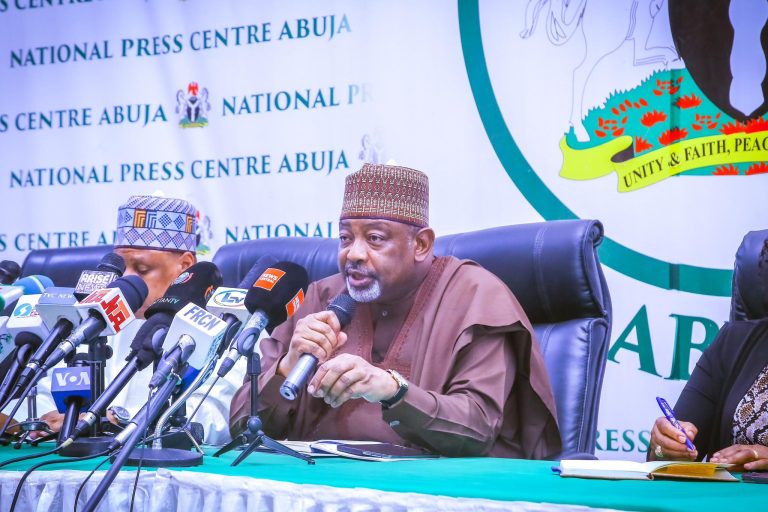Agriculture was one of the pillars of President Bola Ahmed Tinubu’s campaign in the 2023 presidential election. In fact, many opposition party supporters christened the Bola Tinubu campaign and their supporters as ‘Agbado’, a Yoruba word for maize in reference to President Tinubu’s famous Agbado Speech at the 2021 BAT Colloquium where he made reference to the crop.
President Bola Ahmed Tinubu in pages 26 to 29 of his Renewed Hope manifesto outlined initiatives his administration would implement in order to ensure food security, create jobs and enhance national security. They include:
1. Establishment of commodity boards.
2. Enhance food storage and strategic grain reserve.
3. Irrigation (construction of irrigation and water catchment systems using PPP model).
4. Farm cooperatives
5. Improved access to low interest finance for farming-related investments only through a reformed Bank of Agriculture (BOA).
6. Large scale land clearing to bring more arable land under cultivation.
In keeping with these campaign promises, the Minister of Agriculture and Food Security, Abubakar Kyari on Wednesday during a Ministerial press briefing outlined some projects and programmes the Ministry is carrying out to achieve President Tinubu’s food security dream. To ameliorate the growing hunger in the land as a result of food inflation the Minister announced the imminent release of 42,000 metric tonnes of grains from the national strategic grain reserve to be distributed to the highly vulnerable people across the country.
Abubakar Kyari noted that the grains will be distributed in 1200 trucks and sent to various parts of the country where the interventions are most needed. The release, authorised by President Bola Tinubu leaves 11,000 metric tonnes in our strategic grain reserve. However, the Minister announced that the federal government would be supporting 500,000 farmers to cultivate and produce one million metric tonnes of rice.
This would increase Nigeria’s rice production from the current seven/eight million tonnes annually to a new level. The minister also announced , that the government would offtake around 60,000 metric tonnes of rice out of the quantity currently being produced by millers. This will result in an expansion of the national food reserve – another promise by President Bola Tinubu.
Having in mind that food security is a collective responsibility of the three tiers of government Kyari also revealed that 15 state governors had expressed interest to participate fully in this year’s dry season farming, adding that this would help in ameliorating the food crisis being experienced in Nigeria. This is part of the Renewed Hope promise of increasing irrigation farming through collaboration with the public and private sector.
As earlier pointed out by the Minister, 500,000 farmers who are verified to be real farmers would be supported to cultivate rice and other staple food crops. This support is coming in various forms including as very low interest rate loans to the farmers, which would come from a revamped Bank of Agriculture (BOA). The farmers would be encouraged to form cooperatives so as to aid more significant support to them as they take advantage of the economy of scale to increase productivity at reduced cost. This once again is in line with another Renewed Hope promise captured in page 28 of President Tinubu’s manifesto.
On the critical aspect of mechanisation of agriculture, which starts with large scale land clearing to bring more arable land under cultivation, the Minister of Agriculture and Food Security, Abubakar Kyari announced the continuation of the ambitious project, called Green Imperative, which the Federal Government is embarking on in collaboration with the Brazilian government to supply 2000 tractors farmers across the country annually. This is expected to go on for five years! In other words, in five years 10,000 new tractors would have been inducted into the agricultural sector in Nigeria.
This is massive by any standard and is line with the Renewed Hope promise captured in page 29 of the manifesto. The programme estimated to gulp around $1.1 billion, is to be funded by the Brazilian Government through a loan from the Deutsche Bank (DB), Brazilian Exim Bank (BNDES) and Islamic Development Bank. The programme is designed to enable Nigeria acquire 10,000 units of tractors and 50,000 units of assorted implement and equipment for assembly in Nigeria. It is also meant to ensure training of project beneficiaries for over 10 years and establishment of 780 service centers to assist small holder farmers prepare the soil, cultivate and harvest farm produce.
In spite of the of short term food crisis, facing Nigeria currently, there is huge cause to be optimistic following the gradual but sustainable steps being taken by the Federal Ministry of Agriculture to boost food security and affordability. Once production is ramped up drastically, food prices will stabilise and that would be the dawn of the Agbado revolution. Let’s anticipate!

